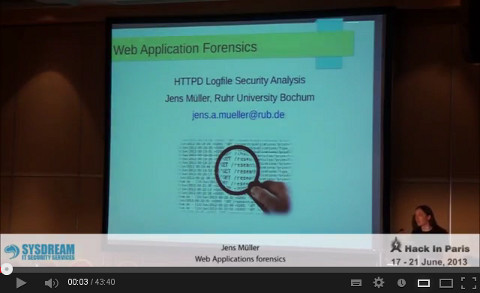Awesome
LORG
A tool for advanced HTTPD logfile security analysis and forensics
Web server log files are the primary source of information to reconstruct the course of events if your website got pwned due to vulnerable web applications. However, extracting the relevant information from huge files can be a difficult task. LORG is a tool aimed at security professionals and administrators to simplify the job of finding the 'needle in a haystack' (aka vulnerable web application) in the scenario of post-attack forensics. It aims to implement various state of the art approaches to detect attacks against web applications within HTTP traffic logs (e.g. Apache's access_log), including signature-based, statistical and machine learning techniques. Detected incidents are subsequently grouped into sessions which are classified as 'hand-crafted' or automated to distinguish whether the attacker is a man or a machine. In addition, geotargeting and DNSBL lookups can be performed to see if the attacks originate from a certain geolocation or botnet. Furthermore attacks can be quantified in terms of success or failure, based on anomalies within the size of HTTP responses, HTTP response codes or active replay of suspicious requests.
Pre-alpha. Previously developed as WebForensik.
Requirements
In order to run LORG, you need PHP and the following PHP extensions:
- pcntl
- simplexml
- filter
- mbstring
- ctype
To install PHP and this extensions on FreeBSD systems, from binary packages, you can run (for instance for PHP version 5.6):
# pkg install php56 php56-pcntl php56-simplexml php56-filter php56-mbstring php56-ctype
Also consider raising memory_limit in php.ini to avoid errors when parsing large files.
Getting started
The easiest way to install LORG is to clone the GitHub repository:
$ git clone https://github.com/jensvoid/lorg
To get started, please read the documentation in the Wiki. For the impatient, try something like:
$ ./lorg -d phpids -u -g /path/to/access_log
Usage
Usage: lorg [-i input_type] [-o output_type] [-d detect_mode]
[-a add_vector] [-c client_ident] [-b dnsbl_type]
[-q quantification] [-t threshold] [-v verbosity]
[-n] [-u] [-h] [-g] [-p] input_file [output_file]
-i allowed input formats: common combined vhost logio cookie
-o allowed output formats: html json xml csv
-d allowed detect modes: chars phpids mcshmm dnsbl geoip all
-a additional attack vectors: path argnames cookie agent all
-c allowed client identfiers: host session user logname all
-b allowed dnsbl types: tor proxy zombie spam dialup all
-q allowed quantification types: status bytes replay all
-t threshold level as value from 0 to n (default: 10)
-v verbosity level as value from 0 to 3 (default: 1)
-n do not summarize results, output single incidents
-u urldecode encoded requests (affects reports only)
-h try to convert numerical addresses into hostnames
-g enable geotargeting (separate files are needed!)
-p perform a naive tamper detection test on logfile
Additional Resources
- Conference Presentation [2013]: Web Application Forensics - Slides for a Talk at Hack in Paris 2013

- Bachelor Thesis [2012]: Implementation of a Framework for Advanced HTTPD Logfile Security Analysis
- Project Description [2012, German]: WebForensik - Forensische Analyse von Apache HTTPD Logfiles